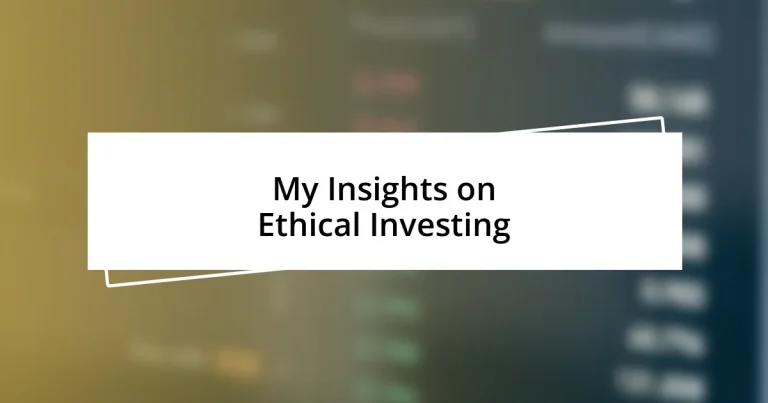Key takeaways:
- Ethical investing aligns financial goals with personal values, fostering both positive social impacts and satisfying returns.
- Key principles include sustainability, transparency, social responsibility, and community engagement, promoting responsible corporate behavior.
- Future trends highlight technology’s role in improving transparency, the emphasis on diversity and inclusion, and the establishment of impact measurement frameworks.
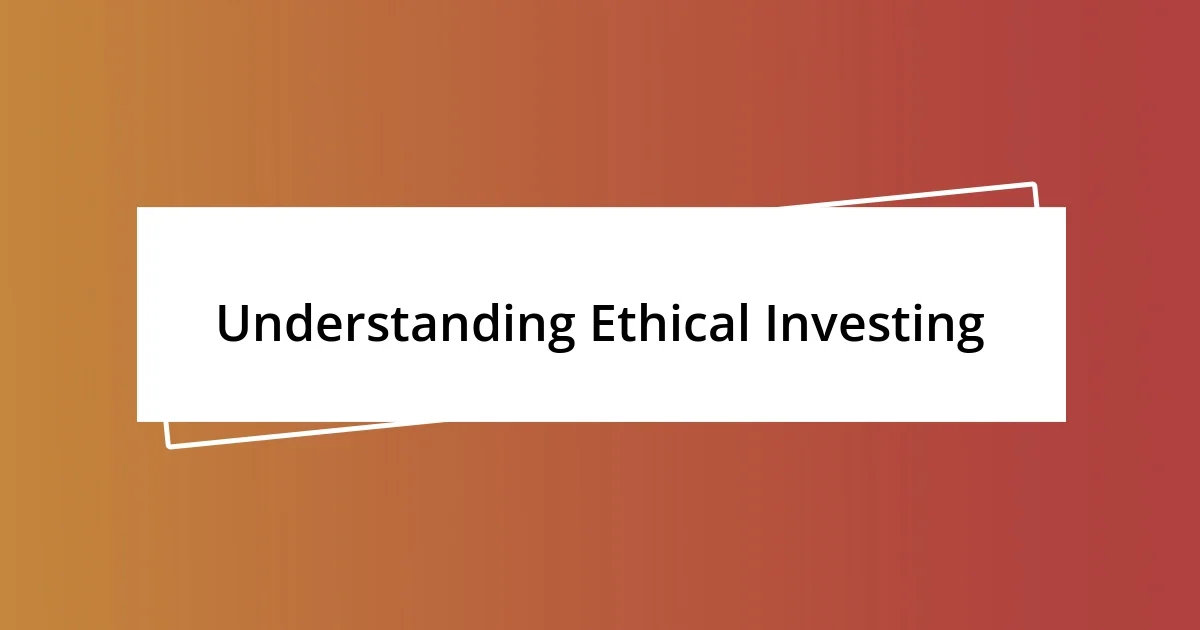
Understanding Ethical Investing
Ethical investing goes beyond just chasing profits; it’s about aligning your investments with your values. I remember the first time I chose to invest in a fund focused on renewable energy. It felt empowering to know my money was supporting initiatives that combat climate change, rather than contributing to industries that harm our planet.
When I talk to friends about ethical investing, they often ask, “Can you really make good returns while being responsible?” My experience has shown that the answer is yes. Many ethical investments not only perform well financially but also create positive social and environmental impacts. It’s a win-win if you do your homework and engage with the right funds or companies that match your criteria.
Understanding ethical investing requires acknowledging that your choices matter. I know it can feel overwhelming at first, but every small step counts. For instance, simply opting for a sustainable fund instead of a traditional one can resonate with my desire to contribute to a better world. How do you want your money to speak for you?
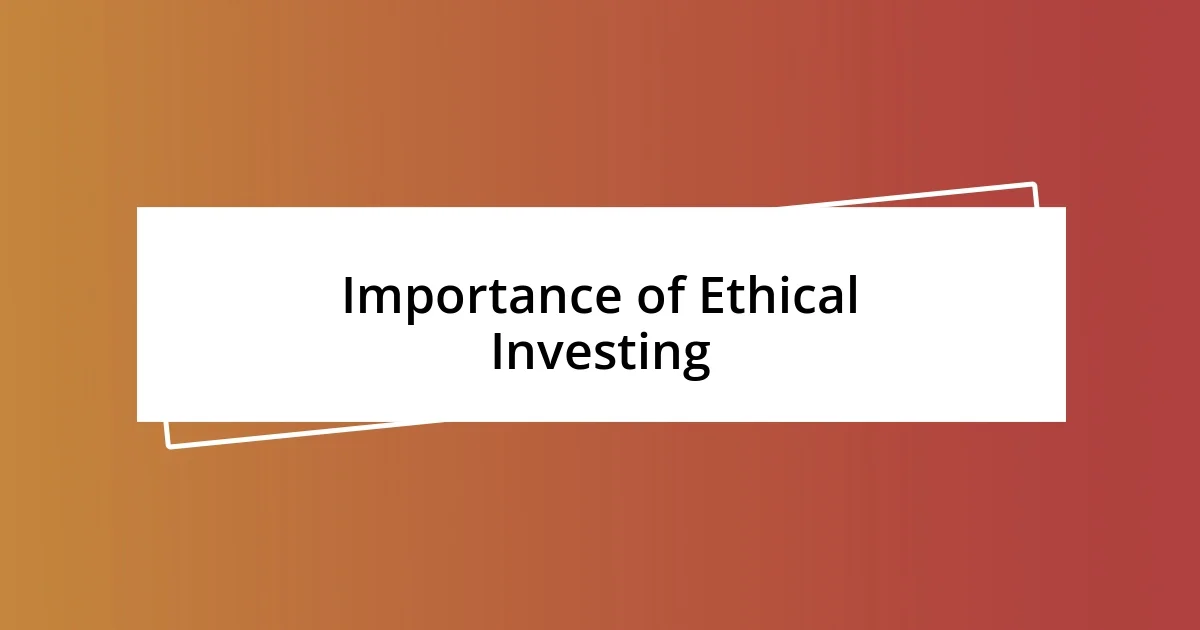
Importance of Ethical Investing
Ethical investing has become increasingly important as individuals seek to make more meaningful choices with their money. I can clearly recall a conversation I had with a colleague who felt conflicted about investing in companies that were solely profit-driven. After sharing some of my personal experiences in ethical investing, he realized that he could align his financial goals with his values, leading to a more fulfilling investment journey. It’s amazing how making informed choices can lead to personal satisfaction while also contributing to a better world.
Moreover, the importance of ethical investing extends to its potential to influence corporate behavior. I’ve always believed that when investors prioritize ethical considerations, companies take notice and begin to change their practices. I remember feeling hopeful when I read about major corporations adopting sustainable practices after pressure from investors. It shows that our collective efforts can drive significant change. Investing ethically isn’t just about personal returns; it’s about creating a ripple effect that can lead to a more responsible corporate landscape.
Lastly, the rising demand for ethical investments reflects a broader societal shift towards sustainability and accountability. It’s not just about individual preferences anymore; it’s a movement. For instance, I’ve found myself seeking out funds with rigorous environmental, social, and governance (ESG) criteria. Every time I come across a fund that aligns with my values, it reinforces my belief that we can create a financial system that supports our collective welfare. Isn’t it incredible to think that our investment choices can contribute to a healthier planet and society?
| Aspect | Ethical Investing |
|---|---|
| Focus | Aligning investments with values |
| Impact | Encouraging corporate responsibility |
| Investor Satisfaction | Personal fulfillment and societal change |
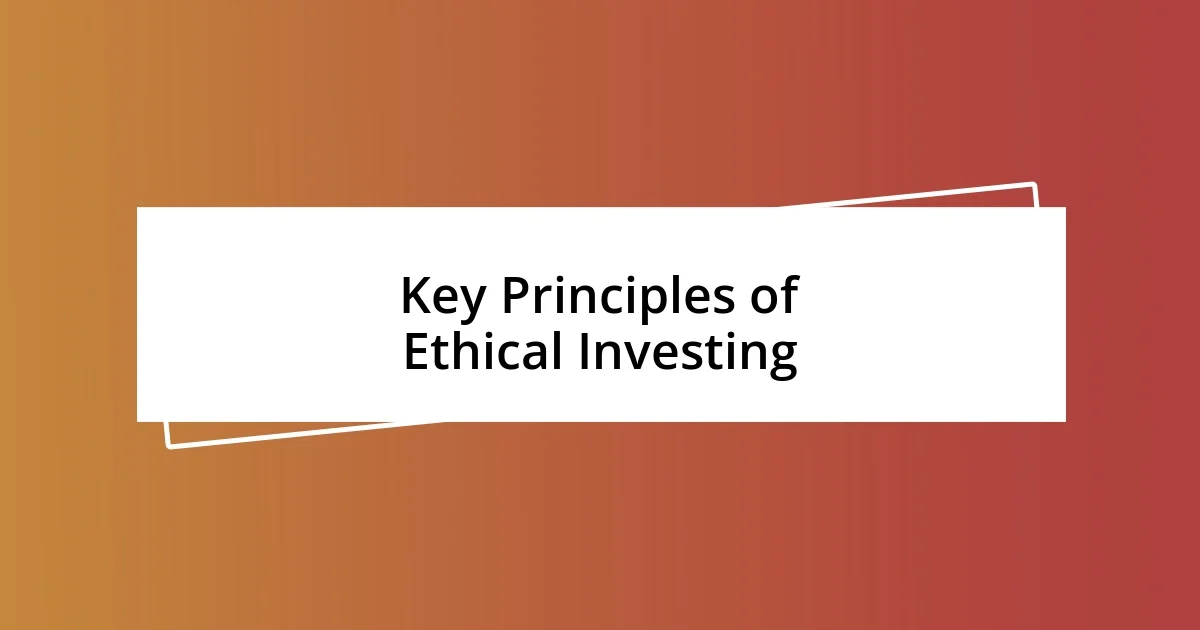
Key Principles of Ethical Investing
Key Principles of Ethical Investing
One of the core principles of ethical investing is the concept of sustainability. I remember the excitement I felt when I first discovered companies that prioritize eco-friendly practices over profits. It struck me how inspiring it is to invest in businesses that genuinely strive for long-term environmental and social health. It’s a refreshing shift from traditional investment strategies that often overlook these critical issues.
In my journey, I’ve also learned the importance of transparency. Ethical investing demands clear communication from companies about their practices and impacts. I’ve been pleasantly surprised by the wealth of information available on firms that are committed to being ethical. Engaging with these resources not only boosts my confidence as an investor but also strengthens my connection to the causes I care about. Here are some key principles to consider:
- Sustainability: Supporting businesses committed to environmental protection.
- Social Responsibility: Aligning investments with societal well-being, focusing on companies helping communities.
- Transparency and Accountability: Investing in organizations that openly share their practices and impacts.
- Long-term Focus: Prioritizing strategies that consider the broader implications of investment choices beyond immediate gains.
- Community Engagement: Seeking companies that actively contribute to their local communities and foster social change.
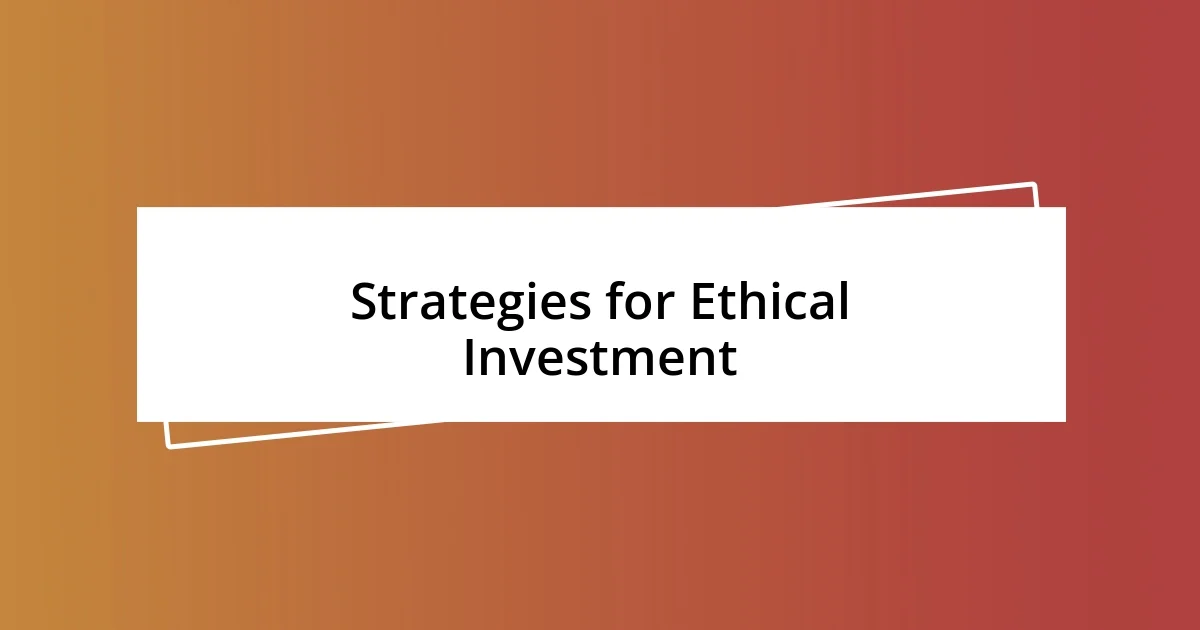
Strategies for Ethical Investment
When it comes to ethical investing, I’ve found that screening investments based on environmental, social, and governance (ESG) criteria can be incredibly helpful. For instance, I remember a fund that not only provided solid returns but also actively invested in solar energy initiatives. It felt gratifying to know that my money was supporting sustainable practices while still growing my portfolio. This dual benefit truly highlights the power of aligning financial goals with ethical values.
Another strategy I often advocate for is engaging with impact investing, where you can directly support projects that yield positive social or environmental outcomes. I think back to a community loan I funded, which helped a local coffee farm transition to organic practices. Not only did I experience a rewarding sense of purpose, but it also made me closely tied to the success of that farm. Isn’t it exciting to think that your investment can have a tangible impact on people’s lives?
Additionally, consider the role of shareholder advocacy. I’ve participated in shareholder meetings where I made my voice heard on issues like climate change awareness and workers’ rights. These experiences reinforced my belief that investors can play an active role in influencing corporate policies. Have you ever wondered how much power we actually have as investors? Through collective action, we can help shape a more ethical and responsible business landscape, driving change from within rather than just sitting back.

Evaluating Ethical Investment Opportunities
When evaluating ethical investment opportunities, I always start by assessing a company’s core values and mission. Recently, I looked into an investment fund focused on renewable energy, and what stood out to me was their commitment to creating sustainable solutions rather than just making quick profits. It made me wonder: how can we, as investors, be part of a movement that genuinely promotes change?
Next, I consider the tangible impact an investment can have on communities. I recall investigating a local tech startup that provides job training for underprivileged youth. By aligning my investment with a company that not only seeks profits but also invests in social good, I felt a personal connection to the mission. Couldn’t we all benefit from knowing we’re contributing to something greater than ourselves?
Lastly, transparency is a non-negotiable factor for me. If a company offers vague reports about their practices, I tend to steer clear. Once, I found an ethical investment opportunity that openly shared its challenges and triumphs in sustainability efforts. It reinforced my belief that open dialogue breeds trust. How else can we make informed decisions without complete clarity? The answers to these questions shape my approach to ethical investing, guiding me toward opportunities that resonate with my values and aspirations.
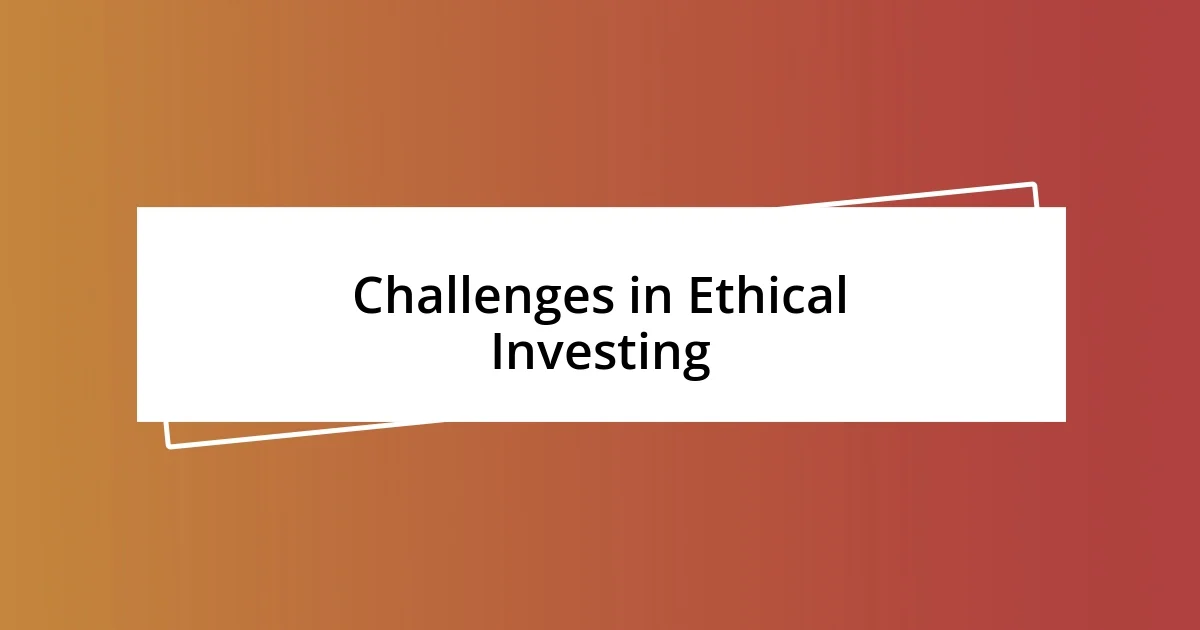
Challenges in Ethical Investing
One challenge I’ve faced in ethical investing is the trade-off between values and returns. It’s tough, isn’t it? I once hesitated to pull the trigger on an eco-friendly fund because its past performance paled in comparison to a more conventional option. In the end, I opted for the greener choice, which left me grappling with a feeling of uncertainty about my financial future. Have you ever felt torn between what feels right and what seems lucrative?
Another significant hurdle is the abundance of information—and misinformation. I remember spending hours poring over reports and articles, trying to discern which companies genuinely lived up to their ethical claims. It can be frustrating when companies adopt “greenwashing” tactics, making them appear environmentally friendly when they’re merely putting on a façade. How can we sift through the noise and trust our investments align with our ethics?
Moreover, the evolving nature of what constitutes an ethical investment complicates decision-making. What seemed ethical a few years ago might be viewed differently today. I recall a time when I invested in a company that later faced backlash for its labor practices. It made me rethink everything I thought I knew about ethical standards in investing. How do we stay current with these shifting values while ensuring our investments reflect our beliefs?
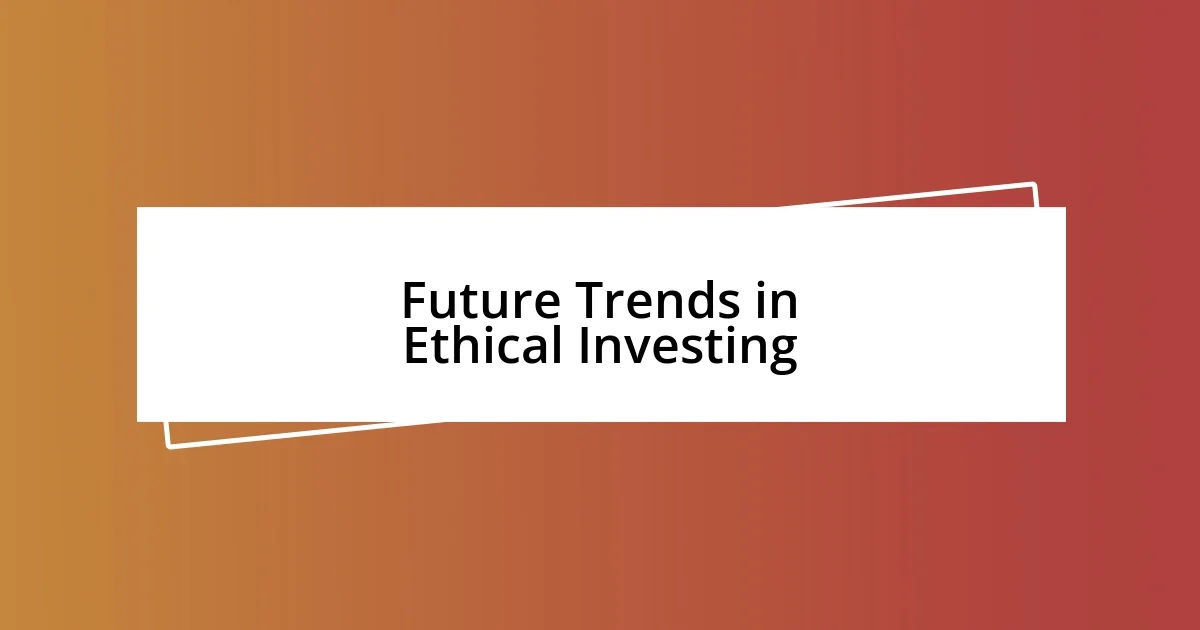
Future Trends in Ethical Investing
As I survey the horizon of ethical investing, I can’t help but notice the rise of technology-driven solutions. Just the other day, I came across a startup leveraging artificial intelligence to analyze corporate social responsibility (CSR) data. It made me think: how can advancements like this empower us to make more informed decisions? I believe this trend will not only improve transparency but also enhance our ability to spot genuine commitments to ethical practices.
Another significant trend is the growing emphasis on diversity and inclusion in investment portfolios. Reflecting on my journey, I recall investing in a fund that prioritized minority-owned businesses. The positive impacts were palpable—not just in financial returns, but in the societal change that unfolded. Isn’t it exhilarating to know our investments can uplift underrepresented communities? I anticipate that more investors will seek to create a balanced representation of diverse firms, fostering equity within the financial landscape.
Lastly, I see a shift towards impact measurement becoming standard practice. When I first ventured into ethical investing, I often felt unsure about how to quantify the effects of my contributions. Recently, I read about new frameworks emerging to track social and environmental returns. It sparked a thought: what if we could evaluate the true value of our investments beyond just monetary gain? This evolving landscape excites me, as it promises to align our financial goals with meaningful outcomes, ensuring that every dollar invested contributes to a greater purpose.












